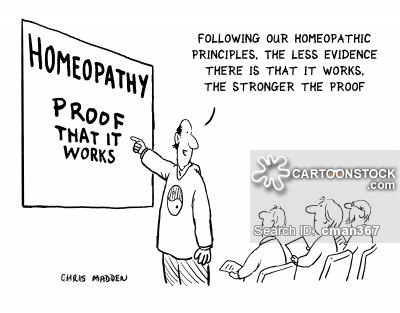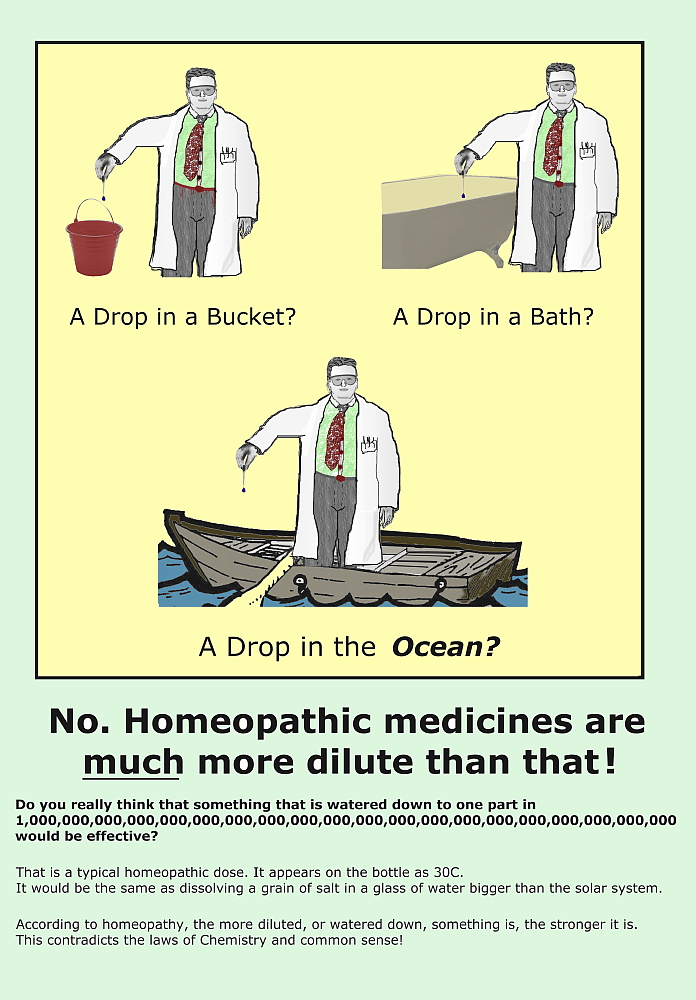 |
| Image from Discoverhomeopathy.com |
Last week homeopathy took another blow, it is strange to me
that it is still around to take another blow, but another blow it is
non-the-less. This time, the attack evidence was aimed at the pharmacies who sell this placebo
nonsense. On the shelves of pharmacies,
homeopathic medication is packaged to look like the conventional medication.
But, as we all know, there is no medication within them. As I have written
before, homeopathy doesn’t work. It is scientifically incompatible with reality
and is simply a money-making scam. Over here in the UK, we have a good (but not
great until they abolish it completely) regulation on the advertising of
homeopathy remedies. Homeopathic medicines are not able to make direct or
implied claims to medical treatments. However, in places such as America, the
laws are a little more relaxed. Either way, they are almost in every single
pharmacy in the world, allowing for the perusal and purchase of an overpriced
pill of sugar.
Keep Homeopathy out of Pharmacies
The National Health and Medical Research Council
(NHMRC) Australian Government Department of Health published a report
called ‘Review of Pharmacy Remuneration and Regulation.’ This report looked at the entire pharmaceutical retail
system in Australia in order to promote safe and ethical pharmaceutical care to
citizens. This report is a cohort with a much larger study by the Australian
government and the Pharmacy Guild. This report focused on describing homeopathy
as:
“The only defence put to the Panel regarding homeopathy was that it was
harmless and able to be used as a placebo in certain circumstances. The Panel
does not believe that this argument is sufficient to justify the continued sale
of these products in pharmacies that supply PBS [Pharmaceutical Benefits
Scheme] medicines. In particular, the Panel notes that the supply of
homeopathic products through pharmacies is not benign but, rather, risks
creating a perception of reliability and efficacy in the mind of the consumer
based on the status of the pharmacy as a healthcare provider. This may
encourage patients to choose a homeopathic product over a conventional medicine
with robust evidence of efficacy, which creates a risk of harm to the patient’s
health…In general, stakeholders put forward the view that pharmacists perform a
valuable role in advising consumers on complementary medicines. However, there
is some concern relating to the sale of products with a limited evidence base,
or none at all, alongside prescription and other scheduled medicine”
I get that’s a massive chunk of text, but it is ridiculously
golden. So, the debate should end there, pharmacies should not sell homeopathy –
as there is no evidence it works.
What Doctors Don't Tell You
I wrote about a year ago on a magazine ‘what doctors don’t tell you’ (WDDTY)- basically a magazine of pseudoscientific
nonsense. On their website, I noticed the article: ‘Australia’s homeopathy kangaroo court on trial’. Now, ordinarily I read these and move on. However,
there were some hefty claims made in the face of overwhelming evidence of the
above review.
The article runs an interesting narrative. Starting off describing
how a ‘renowned homeopath’ basically rolled her eyes, tutted and thought ‘oh,
again’ to diving head first into a conspiracy. The claim that the professor
leading an investigation into the study carrying out a formal review had a
review paper declined because it was of ‘poor quality’. – These guys, for a
laugh I presume, include a reference list at the bottom of this article. I don’t
see any reference to this study that was declined. Also, they state that this
was ‘supressed’ and even under the ‘freedom of information’ act. Just going to
throw this out there – maybe it didn’t exist? You literally have zero evidence
for this. Whilst we are actually talking about this review, they claim that the
panel:
“…failed to include one single expert in homeopathy, thus breaching
NHMRC guidelines for creating specialist committees.”
How on earth do you define an expert in pseudoscience? These guys
literally make stuff up. Plus, it may just be me, I’ve been searching for an
hour and I’ve given up, but I cannot find any guidelines stating this on the
NHMRC guidelines.
The article then focuses mostly
on the claim that this study deliberately left out three ‘solid studies’ that prove that homeopathy does work. So, the
question becomes, is the Australian government cherry picking studies that only
prove the point that homeopathy doesn’t work? So, let’s systematically go
through these.
Study One
Published in 1986 in The Lancet is an article titled: Is homoeopathy a placebo response? Controlled trial of homoeopathic potency, with pollen inhayfever as model. This paper from over 20 years ago is part of the evidence they are using to refute a series of systematic reviews. Anyway, lets humour them. In this study 144 patients with hayfever were taking part of a random double-blind trial. 74 took the placebo and 70 took a homeopathic remedy. They state that the people taking the homeopathic remedy had a clear reduction in symptoms, even though throughout the study, the participants could take anti-histamines (drugs that help prevent hayfever symptoms). However, they say that after a few weeks that anti-histamines were taken more by the control – or so the subjects are saying. So, let’s talk about disclosure with this. When I read a scientific paper, I read the title, the authors and then the acknowledgements and funding. I then decide if the paper is worth reading or not. However, some journals don’t require you to publish affiliations or funding. This one reads:
“This work was supported by the Blackie Foundation Trust, the Research Council for Complementary Medicine and the Scottish Homeopathic Research and Education Trust…. Glasgow Homeopathic Hospital”
Ironically, in the article on WDDTY, they
call out Professor Peter Brookes who chaired a review into homeopathy for his
affiliation with a science group that is active against homeopathy (find me a
science group that isn’t). One rule for one, one for another, eh? So, this is a
study that says homeopathy works, funded by homeopaths and published by
homeopaths. I once turned down a PhD offer because the papers published said
that an instrument worked better than another because it used a column
manufactured the company who funded them and they were going to fund the PhD. So,
yeah, us scientists have no morals. Another caveat with this is the wording
used through the study, the narrative is not that of a normal study, it reads
as though it is proving homeopathy rather than investigating it. The discussion
says, “what other evidence is there that
homeopathic potencies show effects not explicable by suggestion” – loading
the way for them to discuss other studies that only confer with their results. They
don’t objectively analyse the evidence in any aspect of this study, and quite
frankly, I imagine if The Lancet went back to review something like this,
retraction watch would snap it up.
 |
| Image from Ianchadwich.com |
Study Two
Let’s look a diarrhoea, never thought I would have to write or say that in my life. A study published in The Paediatric Infectious Disease Journal titled Homeopathy for childhood diarrhea: combined results and metaanalysis from three randomized, controlled clinical trials used three double blind clinical trials to form a review. The review was conducted by a researcher with a great interest in alternative and complimentary medicines and has appeared on the Homeopathy Research Institute websites. Oh wait, not appears, is a committee member – funny how that isn’t mentioned in the affiliation section? Strangely enough, the story of this article reads like Study One. The narrative, albeit, isn’t as transparent as the first study, is still transparent enough to conclude they are proving homeopathy works, not investigating whether it does or not. The study was published in 2003 and uses three studies from 1990, 1991 and 1994. One of the studies show no statistical significance at all. The other two do show some statistical significance, however, it is very small and have multiple error overlaps. It’s hard to see any actual change in any of these studies, so how a review has been published (on just three studies) is beyond me.
Study Three
The final study was published in 2007 in Explore (I’d never heard of it either) entitled: Efficacy of a complex homeopathic medication (Sinfrontal) in patients with acute maxillary sinusitis: a prospective, randomized, double-blind, placebo-controlled, multicenter clinical trial. The study used 113 people to take placebo or homeopathic medication over eight weeks to see if there were any differences. To establish differences, the volunteers were given points based on their symptoms – a difference of 1.6 points were considered as clinically relevant. Why? I don’t know. They don’t say why, they don’t even indicate why. They don’t give any examples of previous work where this is used, they appear to have just literally made this up.
Let’s look at this logically. With things like sinusitis, there are an extensive list of symptoms. You may feel one, you may feel all. So, if someone in the control group only has a headache but the person in the homeopathic treatment group has a headache and runny nose, they go from two points to one if the nose stops running over 8 weeks. And then the person in the control group still has a headache, that means that the homeopathic medicine is working, right? No, it means his nose stopped running for a bit as sinusitis is rarely just one long continuous symptom. The lead authors also have affiliations with homeopathic industries. But let’s not mention that.
 |
| image from Viskeptics |
Conclusions
There have been systematic reviews of the systematic reviews published on homeopathy. This has been beaten
to death. Homeopaths have failed to provide sound evidence that homeopathy
works – it just simply doesn’t. The studies mentioned here are talking about ridiculously
minute sample sizes. There are studies in homeopathy looking at over 3400 patients in some cases, that yield negative results. All coherent systematic
reviews and studies are showing that homeopathy does not work, it’s time to
dilute this from the earth. But alas, it will not go. It is literally like gum
on the shoe. To the point where they now have a movie out (the anti-vaxxers did
it, so why not?) about how homeopathy works and why science is wrong. You can
read the information on this on quackwatch. No doubt people will send me links
to the movie and tell me to ‘do my research’ – I do, this is about the 6th
blog I’ve published (not all on this site) on homeopathy. And I spend days on
end researching the papers behind them, not just looking at abstracts and saying,
‘oh that proves my point, pop that one in’. In short, keep homeopathy out of everything, especially pharmacies and medicine.
There is a quote by Galileo 'You cannot teach a man anything. You can only help him to find it for himself'. How misunderstood was he?